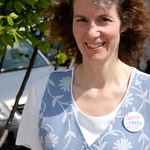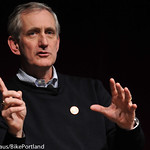“The Value of Jobs“, a coalition of Portland-area business groups that includes the Portland Business Alliance, has published its http://www.valueofjobs.com/candidate_ques/index.html for the City Council race between incumbent Amanda Fritz and her challenger Mary Nolan; and the mayoral race between Charlie Hales and Jefferson Smith.
The one question (of 15) that dealt with transportation policy, and how the candidate’s answered it, is worth noting.*
Here’s the question:
As the city’s population grows at the same time our ability to expand our existing transportation infrastructure remains limited, how will you balance the need to accommodate more trips by alternative modes of transportation while preserving access for freight and automobile mobility? Please give specific examples.
Note the language they use. They continue to assume that we will be “preserving access for freight and automobile mobility” in the future and that everything else is just an “alternative” that we must figure out how to “accomodate.” And notice how any changes to the roadway for these “alternative modes” can come only if we “expand our existing… infrastructure”. They don’t seem to understand — or they don’t want to accept — that the future will be about re-allocating existing space and using more of it to improve access for bicycles and other non-auto modes.
Now. Onto the answers.
Amanda Fritz used this question to talk about the need for new revenue. “As we seek to complete inadequate infrastructure and fill operational/maintenance funding gaps for freight, passenger and commercial autos, transit, pedestrians (including wheelchair users) and cyclists,” she wrote, “we must find stable and permanent funding sources that share the costs across all who benefit from our roads and rights-of-way, rather than continuing to rely on shrinking gas tax revenues.”
Fritz is correct in understanding that we need to go beyond the gas tax, especially as, “transit, electric vehicles, bicycles, and other modes of transportation continue to grow.” But how should we raise more money? “All potential funding sources must be on the table for discussion,” she says, “including fees, taxes, licenses, and other options.” Is that an endorsement of a tax on bicycles and/or bicycle operators? Not exactly; but she’s certainly leaving that door open.
Mary Nolan’s answer was much more concise. She mentioned carpooling and land use/zoning policies that reduce trips. The most interesting part of her response was that Portland should, “Optimize the capacity of existing streets.” I liked that part; but then she went on to say, “by integrating modern design practices like human factors and driver aids to speed traffic safely.” Does anyone know what that means exactly?
On the mayoral side, Charlie Hales answered first. He told the Value of Jobs coalition that he’s an advocate for a “multi-modal approach” but that, “First and foremost, we need to fix what we have by filling the potholes and prioritizing basic maintenance so the roads are safe for everyone…” This is the “Roads first” mantra he has made into a centerpiece of his campaign (which I’ve criticized as being a veiled attempt to win anti-bike votes). Similar to his recent blog post on active transportation, Hales says he wants a “balanced approach” where all road users get what the access they want and need. The question is: Is that possible? Or is Hales just trying to please everyone?
Jefferson Smith used his answer to focus on safety, which he referred to as the “most basic of basics” when it comes to transportation (some question Smith’s credibility on safety given his terrible driving record and numerous speeding tickets). He also gave a nod to keeping up with basic maintenance and “hazardous roads”, which he said he’d prioritize “over mega-projects like the CRC [Columbia River Crossing].” Smith was more specific than Hales, saying that he’d look for cost-savings similar to Mayor Adams’ innovative “Out of the Mud” initiative. Also on funding, Smith, like Fritz, noted he’d work to find new revenue sources in light of the declining power of the gas tax. In a plea for partnership, Smith said his approach would “require… business leadership.”
The election is coming fast. Expect to see more local political coverage in the coming weeks and months.
—
*The questionnaire also asked about the CRC project. You can read that response and all the others here.





